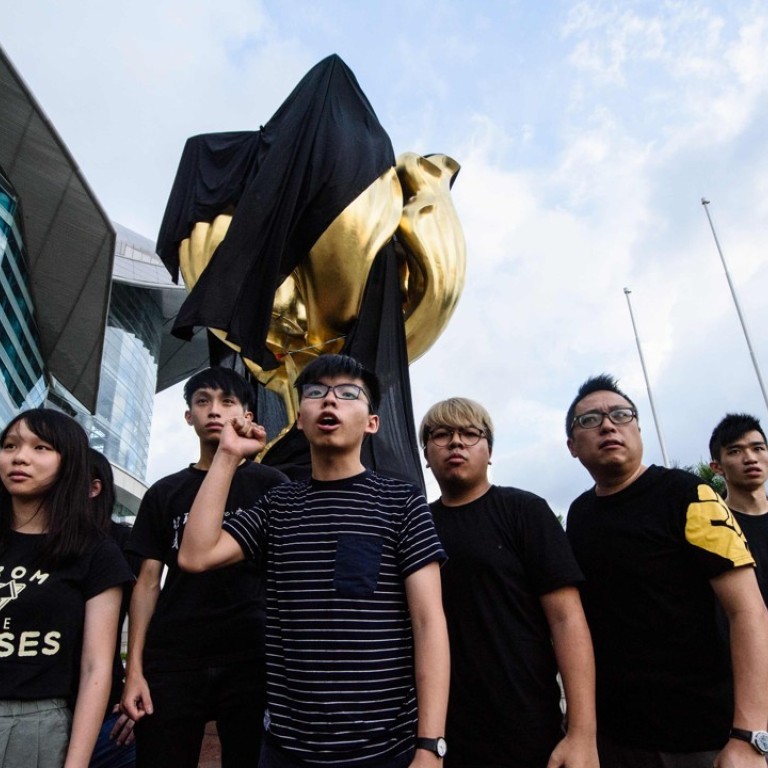What do the following words have in common: “independent institutions”, “high degrees of autonomy”, “Hong Kong people ruling Hong Kong” and “masters in your own house”? These are all words that China’s top leaders have repeatedly used in the
Basic Law as well as in speeches and policy documents to describe Hong Kong’s political status. They are also words that reflect widespread academic and legal definitions of self-determination.
Self-determination is often defined as the ability of a population to determine for itself its own political reality. A Hong Kong government press release, however, said: “If a person advocates or promotes self-determination or independence by any means, he or she cannot possibly uphold the Basic Law or fulfil his or her duties as a legislator.” Recently, the Electoral Affairs Commission disqualified self-determination advocate, Agnes Chow, from a Legislative Council by-election. This decision to target self-determination, and group it together with independence, is highly problematic. It reveals a lack of understanding of Hong Kong’s current status and how it compares to similar forms elsewhere. The decision is a self-inflicted wound for the Hong Kong government’s efforts to undermine calls for independence. It also feeds perceptions that Hong Kong’s powers are collapsing when, in fact, one of the remarkable features of Hong Kong since
the 1997 handover is that the territory has been able to hold onto its powers.
What is the Basic Law of Hong Kong?
Across the world, self-determination without full independence has provided core states and local territories with a mutually beneficial way to undermine independence movements and overcome the dangers of secessionism. It is true that some people feel that an independent state would fulfil their self-determination aspirations. But often, local populations express their self-determination by rejecting full independence and embracing partial independence. Polls in places as diverse as Scotland, Catalonia, the Basque Country, Northern Ireland, Greenland, Bermuda, Puerto Rico and Hong Kong show that the majority neither want complete independence nor full assimilation by the core states. Instead, majorities want to maintain their own version of “
one country, two systems” in which there is a division of power whereby they have their own independent institutions and high degrees of autonomy while having the benefits of cooperation within a larger core state.
When Hong Kong’s government speaks out against self-determination, it contradicts the promises of self-rule and independent powers that come from Beijing, such as the multiple references in
China’s 2014 White Paper to Hong Kong’s independent (
duli) institutions. More importantly, by opposing self-determination, Hong Kong’s government misses a golden opportunity to encourage a sense of loyalty to the city’s existing autonomous system.
None of the autonomous regions in the world are utopias. All have sometimes frustrating problems. And there are always better ideas on how to improve the division of power. But the local support they often enjoy is no accident; again and again, systems of shared power surpass the alternative of full independence when it comes to wealth, security and self-rule. As a result, a type of local nationalism often emerges among the majority in which people’s first loyalty is to neither their locality nor their core state alone, but to the form of shared rule in which people happily maintain overlapping identities between the one country and two systems.
The Hong Kong pro-independence banner saga
When the Hong Kong government works to silence people advocating self-determination, the danger is that it will alienate those who are believers in Hong Kong’s current autonomous arrangement. These people have watched as most of the dire predictions that China would curb local autonomy did not materialise. More than two decades after the handover, Hong Kong has a high degree of rule of law and independent institutions. Apple Daily has not closed its doors. Local book stores still sell books that are banned on the mainland. People still exercise their rights to protest, form political parties and access Google. Meanwhile, China has worked with Hong Kong to foster business, build infrastructure and forge preferential trade agreements.
Some may say that Hong Kong’s government was right to target self-determination advocates like Agnes Chow because her party,
Demosisto, is an independence movement in disguise that favours a potentially destabilising referendum on status. If this is the case, the government should target the secessionism that they might see rather than needlessly widening its attack to all forms of self-determination, which include Hong Kong’s current partially independent arrangement.
David A. Rezvani is the author of Surpassing the Sovereign State: The Wealth, Self-Rule, and Security Advantages of Partially Independent Territories. He teaches at Dartmouth College, US
This article appeared in the South China Morning Post print edition as: Don’t silence self-determination supporters


